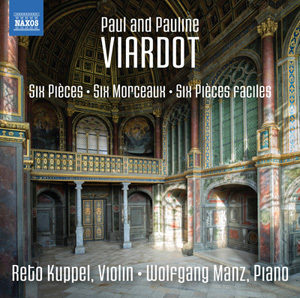“Salon music” became a thing in 19th-century Europe, dominated by piano works, for the obvious reason that the piano was the dominant piece of furniture in the salons of those wealthy and/or privileged enough to even have such a thing as a “salon”. But the violin wasn’t far behind as an instrument of choice–after the voice, at least in part because its tone and potential for sensuality and charm, along with impressive virtuosity and emotional expression (features important to and expected by those who attended these salon gatherings) was equal to the voice, and even greater in range and–in the hands and fingers of a capable player–in its ability to dazzle with technical feats. The composers represented on this disc were there, and were important presences, in some of the more distinguished and notable gatherings, associating with many of the more celebrated musical personalities of the time, including Berlioz, Fauré, and Gounod.
Pauline (mother of Paul) was a famous singer–her sister also, the soprano Maria Malibran, and their father a celebrated tenor. She premiered Brahms’ Alto Rhapsody in 1870. But she also composed, and here are her Six Morceaux, written for her son, a developing young violinist. Charming, technically not for the timid or fearful, and fully idiomatic, these are uniformly bright and cheerful pieces, well-crafted and undoubtedly fun to play, whether by a child prodigy or an advanced “older” student.
The rest of the program consists of works by son Paul, all relatively short–with the exception of the nine-minute showpiece Introduction et Caprice, full of drama and frequent mood-swings, delivered with corresponding sweetly lyrical passages and relentless pyrotechnics from the violin soloist. The titles of most of the pieces tell all–Six Pièces faciles, Berceuse, Rêverie, several Romances–and violinist Reto Kuppel and his totally engaged, artistically compatible, and interpretively sympathetic piano partner Wolfgang Manz together do exactly what performers of this music were expected to do: they sell it. There’s nothing essential here, nothing that amounts to an important discovery, even though the producers claim these to be “world-premiere” recordings. The music is just what it’s designed to be: entertaining, engaging, easily listenable, yet unlike much music that gets shoved into this category, you never sense an air of tackiness or cheap thrills. Refined? Sophisticated? A case could be made–and you should definitely give yourself the chance to decide.
































